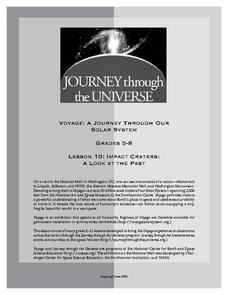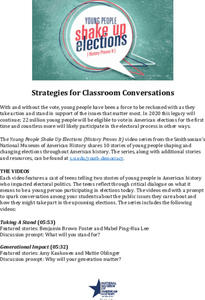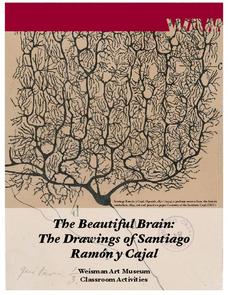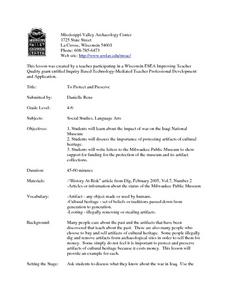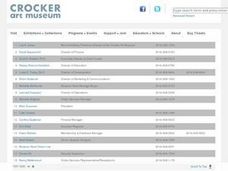Wells Fargo
Wells Fargo History Museum: Curriculum Guide
Learn about the California Gold Rush from an institution that has been in place since the early days of the American West: Wells Fargo History Museum. From domain-specific vocabulary review to group research projects, an expansive packet...
New York City Department of Education
Egypt
This six-week unit encompasses all subjects with a focus study on world history and the development of ancient civilizations. As gifted and talented students dive into the interesting yet challenging topic of Egypt, they think critically...
American Institute of Physics
African American Inventors in History
A two-part lesson introduces young historians to the work of famous African American inventors. Groups first research and develop a presentation of an inventor that includes biographical information and information about one of their...
TED-Ed
A Brief History of Religion in Art
Did you know that some languages have no word for art? The English language does and the narrator of this short video discusses the aesthetic dimension of religious art as it "visually communicates meaning beyond language."
National Woman's History Museum
Getting with the Program
A seven-step lesson introduces the emergence of computer sciences and the contributions women made to the profession after World War II. Several science experiments offer pupils a hands-on learning experience that showcases parabolas,...
Journey Through the Universe
Impact Craters: A Look at the Past
The Galle crater on Mars is also known as the Happy Face crater because of its appearance. First, scholars use pebbles and flour to simulate craters and study their properties. They then apply this knowledge to help decipher the history...
Brooklyn Children’s Museum
Volcanoes!
Give young geologists an up close and personal look at volcanoes with a series of hands-on earth science lessons. Whether they are investigating the properties of igneous rocks, building their own volcanoes, or making fudge to model the...
National Park Service
The Young Naturalist
Beginning with a brief history of our 26th president, Theodore Roosevelt, then followed by a discussion of his interest in nature, young scientists take to the outdoors to locate and observe local plants and insects. Scholars return to...
Smithsonian Institution
Young People Shake Up Elections (History Proves It) Educator Guide
Vote, it's your civic duty! The resource provides several videos about voting in the United States. Scholars watch a series of topics ranging from youth participation to civic action. The educator's guide provides teachers with...
Curated OER
Breaking the Chains, Rising Out of Circumstances
Discuss the history of slavery by analyzing historic photography depicting slavery. Learners write fictional stories based on these photographs. This is a creative and motivating way to launch a discussion of these topics.
Museum of Tolerance
The Role of Citizens in a Participatory Democracy
Groups research participatory democracies and compare the role and rights of citizens in ancient history with those in recent U.S. history. Guided by a series of questions, individuals compose a persuasive essay in which they discuss the...
University of Minnesota
Beautiful Brain: Strangest Dream
Do words change or add meaning or interest to a work of art? The final lesson in a four-part series on the beautiful brain as a work of art focuses on art analysis. Scholars write a story about exploring art from the inside. Reflections...
Brooklyn Children’s Museum
Rocks and Minerals in Our Lives
Young geologists discover the important role that rocks and minerals play in our everyday lives through this series of hands-on activities. Starting off with a lesson that defines the difference between plants, animals, and minerals,...
Montana Natural History Center
Studying Grassland Ecosystems
At first glance, grassland ecosystems might seem dull and uninteresting, but once you start to explore it's amazing the things you'll find! Through this series of engaging lessons, activities, and experiments, elementary students examine...
Curated OER
The First Farmers
Students investigate how constant irrigation, with repeated evaporation of water eventually ruined farm land in southern Mesopotamia. They discuss the development of irrigation.
Curated OER
To Protect and Preserve
Students discuss the impact of war on the Iraqi National Museum and the importance of protecting artifacts of cultural heritage. They write letters to the Milwaukee Public Museum to show support for funding for the protection of the...
Curated OER
Understanding Cladistics
Students explore cladistics and create a cladogram of their own. They are shown how the scientist at the American Museum of Natural History use a method called cladistics to group animals. Students are asked how the animals (lion,...
Curated OER
Combating Corrosion
Students perform an experiment to show the chemical reactions that occur when metal corrodes. They apply the results of the experiment to the conservation efforts of art curators trying to restore an ancient Greek bronze. This lesson...
Museum of Tolerance
My Experience with Injustice
As part of their preparation for a visit to the Museum of Tolerance, individuals are asked to write about a time when they witnessed or experienced unjust, biased, or prejudicial treatment. A great way for writers to make a personal...
Museum of Tolerance
Developing Media Literacy
To protect young people from questionable content, many schools limit access. This resource suggests that because learners can so readily avail themselves to unrestricted Internet access, it is vital for 21st century learners to develop...
Curated OER
When Art Conveys Political and Social Conflict
Twelfth graders consider art as a medium to convey information and opinions on social conflict and issues. They analyze images from the Crocker Art Museum, discuss their effectiveness in raising awareness of an issue, and create a...
J. Paul Getty Trust
O Greek Shape! O Fair Pose!
Everything old is new again. The Los Angeles J. Paul Getty Museum presents a lesson plan on how Greek black-figure painting influenced eighteenth century Neoclassical artists. After looking at a series of examples, class members create...
Early Childhood Learning and Knowlege Center
My Body My Senses
In a comprehensive unit of activities, learners explore the five senses. Youngsters discover the many different body parts and their functions that allow humans to have sense of sight, touch, smell, taste, and hearing. The best way to...
Curated OER
About Life: The Photographs of Dorothea Lange Going to the Promised Land
To better understand the migrant experience during the Great Depression, pupils analyze two primary resources: photographs by Dorothea Lange and a U.S. Map that shows the Dust Bowl. They compare and contrast Lange's images to Steinbeck's...







